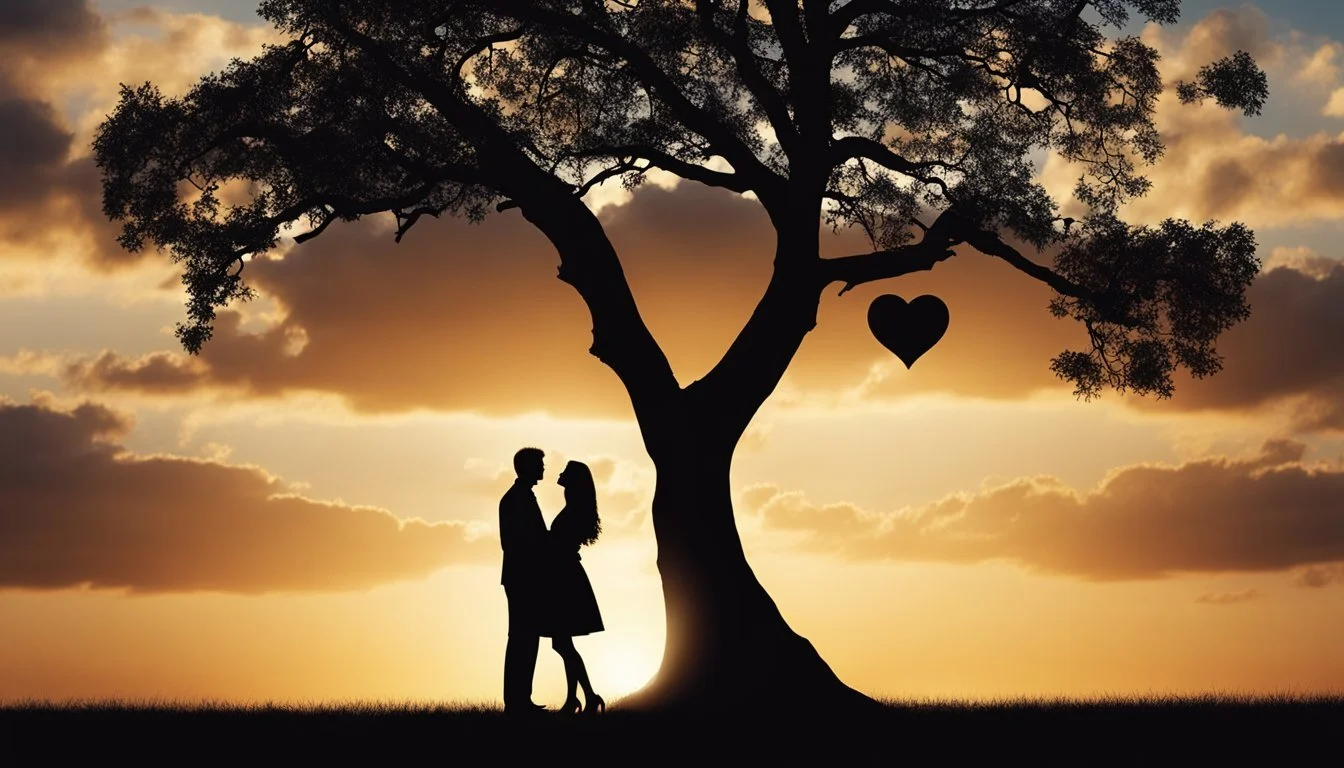8 Documentaries About Love That Will Challenge Your Perspectives
Unconventional Views on Romance and Relationships
Documentaries about love offer unique insights into the complexities of human relationships. These films explore various aspects of romantic connections, from heartwarming tales of long-lasting partnerships to the challenges faced by couples in different circumstances.
By watching these documentaries, viewers can gain new perspectives on love and relationships, challenging their preconceived notions and expanding their understanding of human emotions. The eight documentaries featured in this article cover a wide range of love-related topics, providing a comprehensive look at the many facets of romantic relationships in the real world.
1) "The Power of Love" by Oprah Winfrey (2024)
"The Power of Love" explores how love shapes our lives and society. Oprah Winfrey takes viewers on a journey through various expressions of love, from romantic partnerships to familial bonds and altruistic acts.
The documentary features interviews with couples, families, and individuals who have experienced profound love. It examines how love can overcome adversity and bring people together across cultural and social divides.
Winfrey delves into scientific research on the effects of love on human biology and psychology. The film presents evidence of how love impacts brain chemistry, physical health, and emotional well-being.
"The Power of Love" also spotlights charitable organizations and individuals driven by love to make positive changes in their communities. It showcases stories of compassion and selflessness that inspire viewers.
Through personal anecdotes and expert insights, the documentary challenges common misconceptions about love and encourages viewers to embrace its transformative potential in their own lives.
More information on "The Power of Love" documentary
2) "Crazy, Not Insane" by Alex Gibney (2020)
Alex Gibney's documentary "Crazy, Not Insane" explores the complex psychology behind violent criminals. The film focuses on the work of forensic psychiatrist Dr. Dorothy Otnow Lewis, who has spent decades studying murderers and their motivations.
Dr. Lewis challenges conventional notions of evil, suggesting that many killers are shaped by childhood trauma and mental illness rather than inherent wickedness. The documentary features interviews with notorious criminals, including Ted Bundy.
Gibney uses a mix of archival footage, animations, and contemporary interviews to present Dr. Lewis's research. The film delves into controversial topics such as dissociative identity disorder and its potential role in violent behavior.
"Crazy, Not Insane" raises thought-provoking questions about the nature of criminality and the justice system's approach to mental illness. It offers viewers a unique perspective on the minds of murderers and the factors that may contribute to their actions.
More information on "Crazy, Not Insane" (IMDb)
3) "Stories We Tell" by Sarah Polley (2012)
Sarah Polley's "Stories We Tell" explores the complex nature of love, family, and memory. This documentary delves into Polley's own family history, uncovering long-held secrets and hidden truths.
The film centers around the revelation that Polley's biological father is not the man who raised her. Through interviews with family members and friends, Polley pieces together the story of her mother's affair and its lasting impact.
Polley uses a mix of real home movies and recreated footage to blur the lines between fact and fiction. This technique highlights how memories and stories can be shaped by different perspectives.
The documentary examines the ways love can be both beautiful and messy. It shows how relationships can be complicated by secrets, while also demonstrating the enduring bonds of family.
"Stories We Tell" challenges viewers to consider how the stories we tell about our lives and relationships shape our understanding of love and identity.
More information on "Stories We Tell"
4) "Won't You Be My Neighbor?" by Morgan Neville (2018)
Morgan Neville's documentary explores the life and legacy of Fred Rogers, the beloved host of "Mister Rogers' Neighborhood." The film delves into Rogers' mission to create quality children's television programming that emphasized kindness and empathy.
Through interviews with family, friends, and colleagues, the documentary paints a portrait of a man dedicated to spreading love and acceptance. It showcases Rogers' innovative approach to addressing complex topics like death, divorce, and racism in a way children could understand.
The film highlights Rogers' unique ability to connect with children through the television screen. It also examines his impact on American culture and his advocacy for public television funding.
Neville's documentary received critical acclaim for its heartwarming portrayal of Rogers' life and work. It reminds viewers of the power of compassion and the importance of treating others with respect and dignity.
More information about "Won't You Be My Neighbor?" on IMDb
5) "The Act of Love" by Michael Haneke (2012)
"The Act of Love" is a thought-provoking documentary by acclaimed Austrian filmmaker Michael Haneke. It explores the complexities of romantic relationships and human intimacy through a series of candid interviews and observational footage.
Haneke's unflinching camera captures raw, unscripted moments between couples at various stages of their relationships. The film delves into the joys, challenges, and vulnerabilities that come with loving another person.
Participants share deeply personal stories about attraction, commitment, jealousy, and heartbreak. Their honest reflections offer viewers a window into the diverse ways people experience and express love.
The documentary examines how cultural norms and societal expectations shape our ideas about romance. It challenges viewers to reconsider their own beliefs and assumptions about what constitutes a healthy, fulfilling relationship.
Haneke's signature style of long, static shots creates an intimate atmosphere that allows the subjects' emotions to resonate. The film refrains from judgment, presenting a nuanced portrait of love in its many forms.
More information about Michael Haneke's films
6) "Love, Antosha" by Garret Price (2019)
"Love, Antosha" offers an intimate portrait of actor Anton Yelchin's life and career. The documentary explores Yelchin's passion for acting, music, and photography through his personal journals and interviews with family and colleagues.
Director Garret Price showcases Yelchin's diverse filmography, from blockbusters like "Star Trek" to independent films. The film highlights his dedication to his craft and his impact on those around him.
Yelchin's struggle with cystic fibrosis is revealed, shedding light on his private battle with the disease. The documentary also touches on his tragic death at age 27, which cut short a promising career.
Through archival footage and personal mementos, "Love, Antosha" paints a picture of a multifaceted artist. It celebrates Yelchin's talents and the love he shared with his family, friends, and collaborators.
The film features insights from notable actors and directors who worked with Yelchin, offering a glimpse into his professional relationships and work ethic.
More information on "Love, Antosha"
7) "P.S. I Love You Forever" by Stefanie Scott (2021)
This documentary explores the enduring power of love through letters. Filmmaker Stefanie Scott uncovers a collection of heartfelt correspondence between her grandparents spanning decades.
The film showcases the intimate moments and profound emotions shared by the couple. Through their written words, viewers witness the evolution of their relationship from courtship to long-term marriage.
Scott interweaves interviews with family members and historical context to paint a vivid picture of her grandparents' lives. The documentary highlights how their love persevered through challenges and separation.
"P.S. I Love You Forever" offers a touching look at commitment and connection in the pre-digital age. It reminds viewers of the lasting impact of handwritten expressions of love and affection.
The film invites reflection on how modern communication methods compare to traditional letter-writing in fostering deep, meaningful relationships.
More information about "P.S. I Love You Forever" on IMDB
8) "Love and Saucers" by Brad Abrahams (2017)
"Love and Saucers" explores the unusual life story of David Huggins, a 74-year-old man who claims to have had intimate encounters with extraterrestrials. Director Brad Abrahams presents Huggins' experiences through interviews and his own vivid paintings.
The documentary takes a non-judgmental approach, allowing Huggins to share his story without skepticism or ridicule. It delves into his first alleged encounter at age 17, when he says he lost his virginity to a female alien.
Abrahams' film offers a unique perspective on love, blending elements of science fiction with a deeply personal narrative. It challenges viewers to consider unconventional beliefs and experiences.
"Love and Saucers" raises questions about the nature of reality, memory, and human connection. The film's respectful treatment of its subject invites audiences to approach Huggins' claims with an open mind.
Through Huggins' artwork and recollections, the documentary presents a portrait of a man whose life has been shaped by extraordinary encounters. It leaves viewers to draw their own conclusions about the veracity of his experiences.
More information on "Love and Saucers"
Exploring Emotional Depth
Documentaries about love delve into the intricacies of human relationships, revealing profound emotional experiences. They offer unique insights into the complexities of romantic connections and their impact on individuals and society.
The Influence of Love Narratives
Love documentaries shape our understanding of relationships through compelling real-life stories. They showcase diverse experiences, from long-lasting marriages to unconventional partnerships. These films often highlight universal themes like commitment, sacrifice, and vulnerability.
Some documentaries focus on cultural aspects of love, exploring how different societies view romance. Others examine the psychological components of attraction and attachment. By presenting authentic accounts, these films challenge viewers' preconceptions about love.
Filmmakers use various techniques to capture intimate moments between couples. Close-up interviews reveal raw emotions, while observational footage provides glimpses into daily life. This combination creates a powerful narrative that resonates with audiences.
Impact on Audience Perception
Documentaries about love can significantly influence viewers' perspectives on relationships. They often present nuanced portrayals that go beyond typical romantic ideals. This can lead to increased empathy and understanding for different types of partnerships.
Many viewers report reevaluating their own relationships after watching these films. They may gain new insights into communication, conflict resolution, or emotional intimacy. Some documentaries also address societal issues related to love, such as LGBTQ+ rights or interracial relationships.
These films can spark important conversations about love and relationships. They provide a shared reference point for discussions on dating, marriage, and family dynamics. By presenting real stories, documentaries offer relatable examples that viewers can learn from and apply to their own lives.
Cultural Perspectives on Love
Love manifests differently across cultures, shaped by traditions, social norms, and historical contexts. Documentaries exploring these diverse expressions offer viewers a window into the rich tapestry of human relationships worldwide.
Diverse Traditions and Customs
In many Eastern cultures, arranged marriages remain common, prioritizing family harmony and social stability. These unions often develop into deep, lasting bonds over time. Indian documentaries frequently explore this practice, highlighting the blend of tradition and modernity.
Western societies generally emphasize romantic love and individual choice in partnerships. Films from Europe and North America often showcase the evolution of dating rituals and changing attitudes towards marriage.
Some cultures celebrate love through unique customs. In Japan, Valentine's Day sees women giving chocolates to men, while men reciprocate on "White Day" a month later.
Cross-Cultural Comparisons
Documentaries comparing love across cultures reveal fascinating contrasts and similarities. Public displays of affection, acceptable in some Western countries, are taboo in more conservative societies.
The concept of dating varies widely. In some Muslim countries, courtship occurs under family supervision. Scandinavian cultures often feature more relaxed attitudes towards premarital relationships.
Intergenerational relationships differ too. Asian cultures typically emphasize filial piety, influencing partner choices. Western societies generally prioritize individual happiness over family expectations.
Cross-cultural couples face unique challenges and rewards. Documentaries exploring these relationships highlight the potential for mutual understanding and growth when navigating cultural differences in love.








